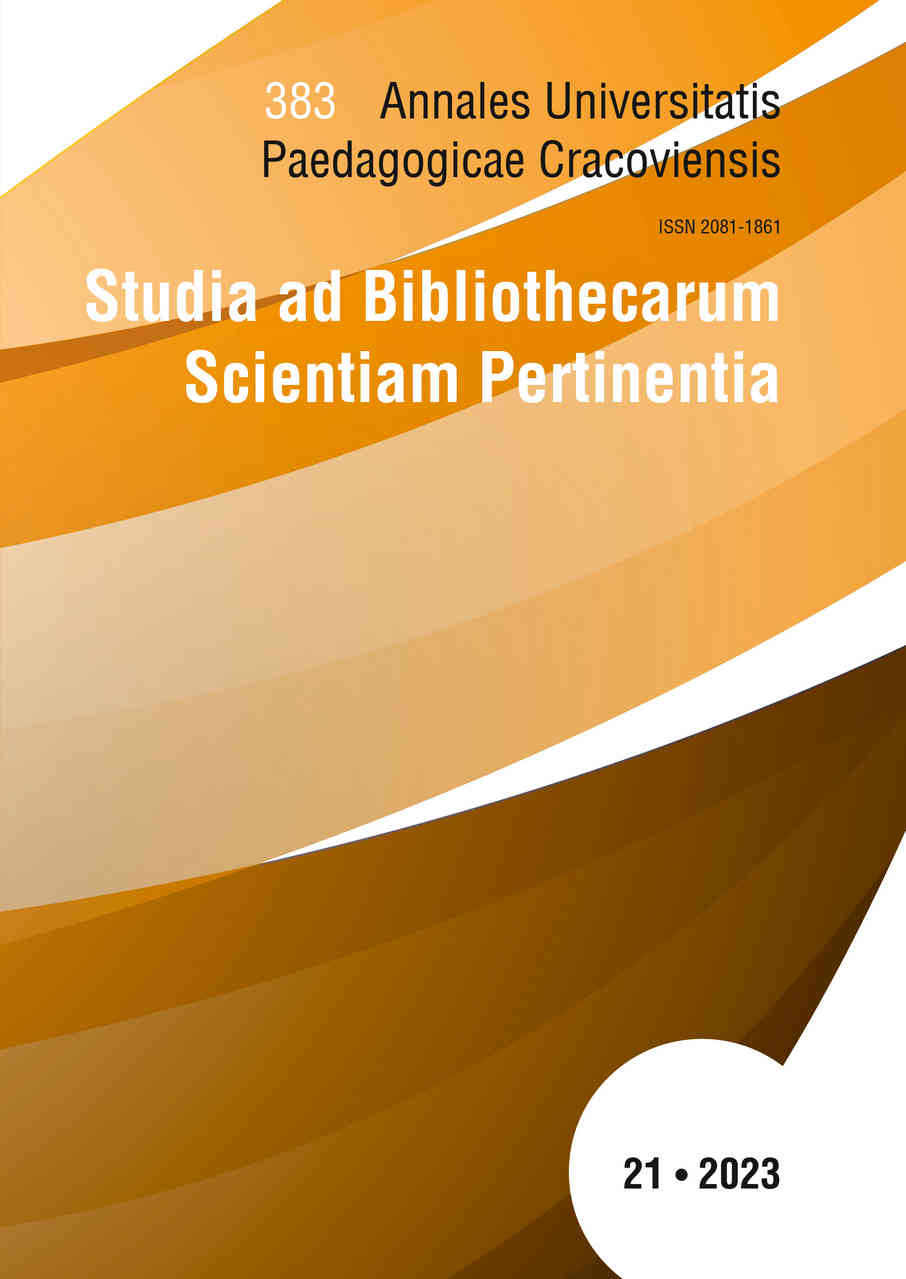European Internet archiving initiatives – review and benchmarking assessment of selected websites
DOI:
https://doi.org/10.24917/20811861.21.27Keywords:
information architecture, Internet archiving, benchmarking, cultural heritage, European archivesAbstract
Archiving the resources of the global Web is a process that takes different forms and intensities in different parts of the world. The article presents strategies for collecting archival data on the Internet, the history of the creation of Internet archives and the problems of Web archiving in Poland. Its main goal is to evaluate 14 selected European Internet archives, showing their strengths and weaknesses, both in terms of content and functionality. The method in this article was based on heuristic and benchmarking methods. A total of eight criteria were assessed – four content-related and four functional (information about the archive; archive resources; completeness and accuracy of information; communication with the user; design and structure of the website; accessibility of the website; navigation tools; timeliness of the website – frequency of changes and entries of documents into the archive). The research was conducted at the turn of May and June 2023. Apart from the author of this article, 20 students in their second year of supplementary studies in information architecture at the Nicolaus Copernicus University in Toruń participated in the study. The conducted research shows that, in terms of content, the assessed websites are at a similar level. Differences are revealed in the assessment of functional criteria. The highest rated content feature was “information about the archive”, the lowest –“communication with the user”. In turn, in the case of functional features, the best scores were for “website timeliness”, and the worst for “service availability” and “service design and structure”. Due to the lack of a Polish Internet archive, the author postulates that future designers should pay special attention to issues related to the general structure of the website, its graphic design, adaptation to the needs of groups of people who may be digitally excluded, as well as the appropriate location of contact forms.
References
Adamus-Kowalska J., Zastosowanie technologii archiwizacji Internetu w identyfikacji i ratowaniu cyfrowego dziedzictwa kulturowego Ukrainy, „Annales Universitatis Paedagogicae Cracoviensis Studia ad Bibliothecarum Scientiam Pertinentia” 2022, nr 20, s. 596–611.
Archiwa Państwowe, Forum archiwizacji zasobów polskiego Internetu, 2021, [on-line:] https://archiwa.gov.pl/forum-archiwizacji-zasobow-polskiego-internetu/ – 27.09.2023.
Archiwum Społeczne Polskiego Webu, Informacje, 2023, [on-line:] https://aspw.pl/informacje – 27.09.2023.
Derfert-Wolf L., Archiwizacja Internetu – wnioski i rekomendacje z kilku raportów, „Biuletyn EBIB” 2017, nr 172, s. 1–11.
Dombrowski Q., SUCHO Project, 2023, [on-line:] https://www.sucho.org/ – 27.09.2023.
Gaca S., Propozycja modelu archiwizacji polskiego Internetu na bazie doświadczeń brytyjskich, „Officina Historiae” 2021, t. 4, nr 1, s. 79–90.
Głowacka E., Studium kompleksowego zarządzania jakością (TQM) w bibliotekoznawstwie i informacji naukowej, Wydawnictwo Naukowe Uniwersytetu Mikołaja Kopernika, Toruń 2000.
Gmerek K., Archiwa internetowe po obu stronach Atlantyku – Internet Archive, Wayback Machine oraz UK Web Archive, „Biuletyn EBIB” 2012, nr 128, s. 1–12.
Gmiterek G., Długoterminowa archiwizacja zasobów cyfrowych, „Res Historica” 2013, nr 35, s. 213–235.
Historia stron, [on-line:] http://historiastron.pl/ – 27.09.2023.
Internet Archive, [on-line:] https://archive.org/ – 27.09.2023.
Jankowska M., Biblioteki akademickie – trendy dotyczące zasobów elektronicznych, [w:] Informacja dla nauki a świat zasobów cyfrowych, red. H. Ganińska, Poznań 2008, s. 168.
Januszko-Szakiel A., Długoterminowa archiwizacja zasobów cyfrowych – program dla polskich bibliotek, „Przegląd Biblioteczny” 2011, nr 79, s. 211–230.
Kahle B., Preserving the Internet, “Scientific American” 1997, nr 276, s. 82–83.
Koncewicz P., Ludzie którzy przechowują Internet, czyli Wayback Machine w pigułce, 2022, [on-line:] https://antyweb.pl/internet-archive-wayback-machine-w-pigulce – 27.09.2023.
Konopa B., Archiwizacja Webu w Europie, „Archeion” 2020, nr 121, s. 1–21.
Konopa B., Strategia selektywna jako narzędzie w archiwizacji Webu. Analiza wybranych przykładów, „Archiwa – Kancelarie – Zbiory” 2020, nr 11, s. 97–118.
Konopa B., Witryna internetowa jako materiał archiwalny, „Archiwa – Kancelarie – Zbiory” 2016, nr 7, s. 113–120.
Konopka-Nowina M., Problematyka zarządzania informacją w procesie archiwizacji zasobów, „Media, Kultura, Komunikacja Społeczna” 2014, nr 10, s. 30–43.
Kugler A., Beinert T., Schoger A., Archiwizacja Internetu jako usługa naukowa, „Biuletyn EBIB” 2017, nr 172, s. 1–8.
MementoWeb, Guide, 2023, [on-line:] https://timetravel.mementoweb.org/guide/api/ – 27.09.2023.
Nielsen J., Using web archives in research: an introduction, NetLab, Aarhus 2016, s. 15–25.
Sapa R., Benchmarking w doskonaleniu serwisów WWW bibliotek akademickich, Wydawnictwo Uniwersytetu Jagiellońskiego, Kraków 2005.
The National Archives, [on-line:] https://cdn.nationalarchives.gov.uk/documents/information-management/web-archiving-guidance.pdf – 27.09.2023.
Ukrainian Research Institute, Russia's war on Ukraine, [on-line:] https://archive-it.org/collections/18886 – 27.09.2023.
W gospodarce, Archiwizacja Internetu to realny problem, 2018, [on-line:] https://wgospodarce.pl/informacje/44931-archiwizacja-internetu-to-realny-problem – 27.09.2023.
Wilkowski M., Oddolne archiwizacje Internetu jako działania społeczne, „Archiwa – Kancelarie – Zbiory” 2015, nr 6, s. 207–220.
Wilkowski M., Wayback Machine – podstawy wykorzystania, „Biuletyn EBIB” 2017, nr 172, s. 1–3.
Woźniak W., Archiwizacja Internetu – próba podsumowania dotychczasowych prac i ustaleń, „Archiwa – Kancelarie – Zbiory” 2019, nr 10, s. 75–98.
Downloads
Published
How to Cite
Issue
Section
License
Copyright (c) 2024 AUPC Studia ad Bibliothecarum Scientiam Pertinentia

This work is licensed under a Creative Commons Attribution 4.0 International License.

